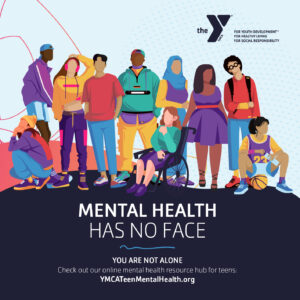
In response to the growing mental health challenges teenagers are facing, the NC Alliance of YMCAs is coordinating a statewide effort aimed at supporting teen mental health.
Through a $3.75 million grant awarded by North Carolina legislators to the Alliance, North Carolina YMCAs are committed to addressing the critical needs of teens by identifying mental health challenges, providing resources and connections to mental health providers, and fostering supportive communities that understand mental health is part of our overall health.
Recognizing the importance of mental well-being for adolescents, especially post-Covid, NC YMCAs are launching a multi-faceted approach. This includes the new Teen Mental Health Resource Hub, housed on the Alliance’s website at ncymcas.org/YMCATeenMentalHealth; a teen mental health destigmatization campaign, “Mental Health Has No Face;” new and expanded teen programming at Ys across the state; partnerships with local mental health providers; and training for staff.
Youth Mental Health First Aid Training
YMCA staff who work with teens are being trained in Youth Mental Health First Aid (YMHFA), which introduces common mental health challenges for youth, reviews adolescent development, and teaches a five-step action plan for how to help teens in both crisis and non-crisis situations. According to data from the National Council for Mental Wellbeing, those trained in YMHFA have increased mental health literacy and increased confidence in and likelihood to help a young person in distress, and they have less stigma and greater empathy toward youth with mental health challenges. They also use their MHFA skills after the training.
As of the end of March 2024, more than 115 YMCA staff in North Carolina had been certified in YMHFA, with more staff trained regularly. In addition, six YMCA staff have been trained as YMHFA course trainers since January, with at least 10 Y leaders now able to provide the course for YMCA staff in their own communities and around the state.
“With this training, combined with the Y’s approach to positive youth development incorporating character development and social emotional learning, NC YMCAs are in a strong position to help build resilience among teens and help teens understand that they are not alone and that we are here to help,” said NC Alliance of YMCAs CEO Sheree Vodicka. “The Y has always valued community partnerships, and through this work, our Ys are expanding or starting partnerships with local mental health providers so that when Y staff identify a potential problem among youth at the Y, they have a process and path to refer them to a local mental health expert.”
Teen Mental Health First Aid Training
Some North Carolina YMCAs are planning to offer Teen Mental Health First Aid (tMHFA), a course designed specifically for teens aged 15-18 or grades 10-12. A study of nearly 2,000 teens across 44 high schools showed that after teens take the course, they have increased mental health literacy, increased identification of helpful and harmful behaviors, decreased mental health stigma, changes in perception of adults as helpful, and increased confidence to help their peers.
Some Ys are exploring training staff to teach the course to teens, while others are working to offer the course to teens the Y employs and teens in YMCA programs.
Character Development and Social Emotional Learning
YMCA Youth Development staff also are trained in positive youth development techniques that increase social emotional learning (SEL) capacity. Research shows that youth who learn SEL skills have higher emotional intelligence growth, which leads to better mental health, more engagement in the classroom, stronger decision-making skills, and healthier relationships.
The Collaborative for Academic, Social and Emotional Learning (CASEL) notes that “While SEL and mental health are not the same, SEL can promote positive mental health in many ways. By promoting responsive relationships, emotionally safe environments, and skills development, SEL cultivates important ‘protective factors’ to buffer against mental health risks.”
Community Care Model
While local North Carolina YMCAs are approaching teen mental health work in different ways, they are all committed to supporting teens and their families in navigating mental health challenges and connecting them to mental health providers when needed.
“YMCA staff aren’t experts in mental health, but they are experts in positive youth development, and they are living into the mental health community care model– a preventive model of care that equips and empowers all individuals with the ability to provide informal, community-based mental health support,” Vodicka said.
This community-based support focuses on mental health promotion to encourage and increase healthy behaviors, protective factors, and resilience to reduce the risk and impact of mental illness, provide early intervention and support the process of healing and recovery.

